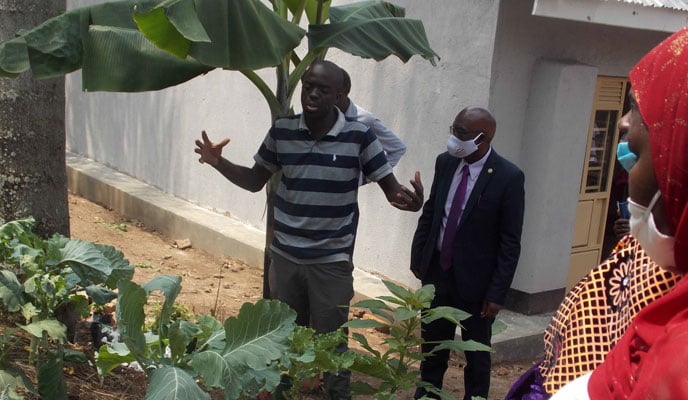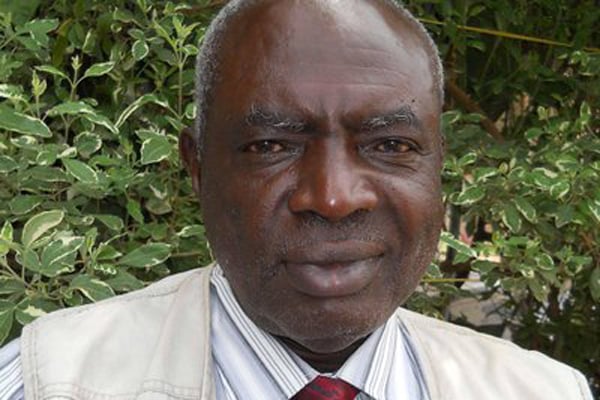Farmers tipped on urban farming

Daniel Aliddeki (in striped shirt) of St Jude Agricultural and Vocational Institute explains to farmers how to sustain a small vegetable garden in the compound. PHOTO/MICHAEL J SSALI
What you need to know:
- As is demonstrated at St Jude Agricultural and Vocational Institute such gardens are made by putting a heap of soil on the ground in the compound and barricading it with planks to give it protection and to minimise soil erosion.
Anew effort to enhance organic vegetable production and other forms of farming in urban centres in Uganda has been launched.
The five-year project spearheaded by Jenny Flathen Taylor Foundation (JFT-Foundation), a local NGO which is a subsidiary of a global organisation, Seeding Africa, launched its activities at St Jude Agricultural Institute Busense, in Masaka District last week.
Former vice president Edward Ssekandi was the chief guest at the function which was attended by farmers’ representatives, two Members of Parliament, and other stakeholders from the districts of Amuru, Apac, (northern Uganda) Mbale, Iganga, Bukedea, (eastern Uganda) Mukono, Mityana, and Masaka (central).
Improving urban farming
“We aim at improving urban farming and urban greening with a view to improve nutrition, to reduce poverty and to preserve the natural environment,” says Dr David Everest Bulonge, country representative of JFT-Foundation.,
Thousands of households in urban centres cannot afford vegetables and animal protein in their diet due to financial constraints.
They suffer from malnutrition, yet according to Dr Bulonge, they can be given the skills to produce their own vegetables and meat not only for domestic consumption but also for sell to earn some money.
He also said that not only can residents in urban settings produce their own food but they can also add beauty to the towns by planting flowers and some food crops such as ginger in flower gardens.
“This is especially applicable in areas where you have some shops or buildings close to the gardens where the crops and flowers are under the close watch of the people who will take interest to ensure they are not stolen or vandalised,” he says.
Target groups
The project will target different categories of communities in urban settings such as farmers’ groups, schools, tertiary institutions, youths, and the security service departments such as police, and prisons in the project pilot districts. “All that one needs to begin farming is some space and the necessary skills,” Bulonge explains.
“A sack of soil, well mixed with manure is enough for the urban dweller to grow crops such as sukuma wiki, tomatoes, nakati, and some other vegetables.”
About five representatives from the target farming groups and communities in the different parts of Uganda will periodically be sent to St Jude Agricultural and Vocational Institute to get training in farming on small spaces.
“Many households in communities such as police barracks live in small houses with very small compounds,” Bulonge went on to explain: “Such people can engage in small animal husbandry such as rearing rabbits in simply constructed structures. They can also rear goats, sheep, and pigs or even cattle under zero-grazing.
They could practice poultry. Small animal husbandry and poultry will provide the urban farmer with droppings and urine which is manure for crops. They can grow vegetables on sacks filled with soil mixed with livestock droppings or in small gardens measuring like three by five metres.”
Demo garden
As is demonstrated at St Jude Agricultural and Vocational Institute such gardens are made by putting a heap of soil on the ground in the compound and barricading it with planks to give it protection and to minimise soil erosion. The soil is then evenly spread within the wooden enclosure and well mixed with cow dung or any other organic matter.
Emphasis will be put on indigenous vegetable production in the different parts of the country and organic farming practices. The institute has a seed bank of indigenous vegetables which can be multiplied by farmers.
“We do not give them out in large quantities but we provide small amounts of them to farmers to go and plant with the view of multiplying them to their required quantities,” said Mr Daniel Aliddeki the Principal of the institute and chief facilitator.
Aliddeki who studied organic farming in India and the US is in charge of 100 small scale farming demonstration projects on the institute of about 140 acres. He takes visitors and students around the various small gardens and livestock enclosures demonstrating how they can be run sustainably.
Lessons
He emphasises recycling as one of the big lessons to be learnt at the institute. “You will see that a lot of manufactured items such as plastic water bottles are used for drip irrigation, for example,” he says.
“Whatever else you may find on the farm was most probably manufactured to serve a different purpose from what it is serving now. Then we also make sure that the farming activities are integrated. The pigs and cattle droppings as well as their urine are used as manure for crops. Yet the crop residues are given to the animals as feeds.
We also practice space maximisation by planting several different crops in the small gardens which are rendered so fertile by constant application of organic fertiliser,” he adds.
The institute also teaches rainwater harvesting and conservation. He further mentioned the strategic location of the farming activities. The cattle sheds are located near the biogas pit to avoid carrying cow dung on wheelbarrows to a far off place. The orchard, where beehives are, is located near the aqua culture area so that bees and some plants easily get water to use.
JFT-Foundation which works under the slogan “feeding our future” seeks to protect the natural environment. “It is one of the reasons that we promote organically grown seeds to minimize the amount of upstream pollution in the seeds production process,” says Edwina Jenny Flathen Taylor, Founder and Chair, Seeding Africa, Norway.
“Organic systems executed in a sustainable way can minimise ground water pollution, erosion and soil degradation. We are not only transforming the lives of farmers but also protecting the environment,” she adds.
Target
The project will target different categories of communities in urban settings such as farmers’ groups, schools, tertiary institutions, youth, and the security service departments such as police, and prisons in the project pilot districts.




